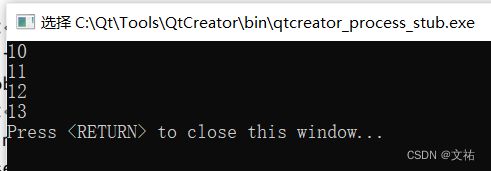C++11中的Lambda基础
1、Lambda表达式的基本语法
语法:[] () specifiers exception attr ->ret { /*do something;*/}。
[] : 可选捕获列表引入Lambda;
() : 可选参数列表;
specifiers exception attr : 可选,mutable、异常说明符或者noexcept、attributes;
->ret : 可选,追踪返回类型;
{} : Lambda函数体。
2、一些Lambda表达式示例
2.1 最简单的Lambda
[]{};
这是最小的Lambda表达式,用[]引入Lambda表达式,{}函数体内为空,该示例中不需要参数列表()。
2.2 有两个参数
[](float f, int a) { return a*f; }
[](int a, int b) {return a<b; }
该示例可能是最普遍的Lambda表达式之一,参数通过()部分传入Lambda,不需要返回类型因为编译器会自动推导。
2.3 追踪返回类型
[](MyClass t) -> int { auto a = t.compute(); print(a); return a; };
该示例中显式设置了返回类型。自C++11开始,追踪返回类型也可用于常规函数声明。
2.4 附加说明符
[x](int a, int b) mutable { ++x; return a < b; };
[](float param) noexcept { return param*param; };
[x](int a, int b) mutable noexcept { ++x; return a < b; };
该示例展示在Lambda函数体之前可以使用说明符。使用mutable也可以是noexcept使得能修改捕获到的变量。并且必须以 mutable noexcept的顺序书写,否侧编译器会抛出异常。
2.5 可选的()参数列表
[x] { std::cout << x; }; // 不需要()
[x] mutable { ++x; }; // 不能编译!
[x]() mutable { ++x; }; // 可以编译,mutable之前要求有()
[] noexcept { }; // 不能编译!
[]() noexcept { }; // 可以编译
在C++17和C++20中像constexpr或consteval说明符也是用相同的模式。
3、Lambda表达式的类型
因为编译器会为每一个Lambda(the closure type)生成一个独特的名称,无法预先“拼写”出它,所以必须使用auto或者decltype来推导类型。
auto myLambda = [](int a) -> double { return 2.0 * a; };
如果有两个看起来一样的Lambda:
auto firstLam = [](int x) { return x * 2; };
auto secondLam = [](int x) { return x * 2; };
即使后面的代码相同,它们的类型也是不一样的。编译器被要求为每一个Lambda声明特有的未命名类型。
下面的代码可以证明这一属性:
#include Lambda表达式的大小:
#include Windows下输出是:
sizeof(myLambda) is 1
因为myLambda是一个无状态的Lambda,是一个空类,没有任何数据成员,所以它的最小尺寸是1字节。
可以将一个Lambda表达式拷贝给另一个Lambda表达式:
#include但它们的类型仍会相同。
4、重载
C++11无法“重载”接收不同参数的Lambda表达式:
// 不能编译
auto lam = [](double param) { /* do something*/ };
auto lam = [](int param) { /* do something*/ };
5、捕获
[ ]不仅引入了Lambda而且保存了捕获到的变量的列表。捕获Lambda域以外的变量可以在Lambda函数体内存取它们。
| C++11捕获语法 | 描述 |
|---|---|
| [&] | 按引用捕获所有的自动存储持续变量 |
| [=] | 按值(创建拷贝)捕获所有的自动存储持续变量 |
| [x, &y] | 显式按值捕获x,按引用捕获y |
| [args…] | 捕获模板参数包,都按值 |
| [&args…] | 捕获模板参数包,都按引用 |
| [this] | 捕获成员函数里面的this指针 |
int x = 2, y = 3;
const auto l1 = []() { return 1; }; // 无捕获
const auto l2 = [=]() { return x; }; // Lambda内使用的所有变量都被拷贝
const auto l3 = [&]() { return y; }; // Lambda内使用的所有变量都被引用
const auto l4 = [x]() { return x; }; // 只有x按值(拷贝)捕获
// const auto lx = [=x]() { return x; }; // 错误语法,不需显式使用=拷贝x
const auto l5 = [&y]() { return y; }; // 只有y按引用捕获
const auto l6 = [x, &y]() { return x * y; }; // 按值捕获x,按引用捕获y
const auto l7 = [=, &x]() { return x + y; }; // 除了按引用捕获x,其他所有都按值捕获
const auto l8 = [&, y]() { return x - y; }; // 除了按值捕获y,其他所有都按引用捕获
为了理解捕获变量时发生了什么,可以考虑下面的示例:
例1:
std::string str {"Hello World"};
auto foo = [str]() { std::cout << str << '\n'; };
foo();
str被按值捕获(被拷贝)。编译器会生成下面的本地函数对象:
struct _unnamedLambda {
inline void operator()() const {
std::cout << str << '\n';
}
std::string str;
};
将变量传入捕获从句时,直接用它初始化数据成员str。
例2:
int x = 1, y = 1;
std::cout << x << " " << y << '\n';
const auto foo = [&x, &y]() noexcept { ++x; ++y; };
foo();
std::cout << x << " " << y << '\n';
编译器可能会生成下面的本地函数对象:
struct _unnamedLambda {
void operator()() const noexcept {
++x; ++y;
}
int& x;
int& y;
};
因为按引用捕获了x和y,所以数据成员的类型也是引用。
6、关键字mutable
默认情况下,运算符()被标记为const,所以不能在Lambda函数体内部修改捕获到的变量。
#include上面的代码在CPPInsights中的运行结果为:
#include因此下面的代码编译器会提示错误:
int x=0;
auto lam = [x]() { ++x; };

如果想要改变这种行为,需要在参数列表之后加上mutable关键字。这个语法有效地移除调用运算符声明中的const。
#include#include下面的代码解释了这一行为:
int x=0;
std::cout<< x<<std::endl;
auto lam = [x]() mutable {++x; std::cout<< x<<std::endl; };
lam();//注意!像使用函数那样使用Lamda表达式,声明Lambda表达式时不需要加(),但使用时必须加上
std::cout<< x<<std::endl;
输出结果:

实际上Lambda只修改了变量的拷贝,并没有真正地修改变量。要实现Lambda体内修改外部变量,可以考虑使用按引用捕获。
int x=0;
std::cout<< x<<std::endl;
auto lam = [&x](){++x; std::cout<< x<<std::endl; };
lam();//注意!像使用函数那样使用Lamda表达式,声明Lambda表达式时不需要加(),但使用时必须加上
std::cout<< x<<std::endl;
int x=0;
std::cout<< x<<std::endl;
auto lam = [&x]() noexcept {++x; std::cout<< x<<std::endl; };
lam();//注意!像使用函数那样使用Lamda表达式,声明Lambda表达式时不需要加(),但使用时必须加上
std::cout<< x<<std::endl;
输出结果同上一示例。
需要注意的一件重要的事情是,当使用mutable时不能将Lambda表达式标记为const:
int x = 10;
const auto lam = [x]() mutable { ++x; }
lam(); // 不能编译,因为不能对const对象调用非const成员函数
7、捕获全局变量和局部静态变量
考察下面的例子:
#include #include 因为只有自动存储持续变量才能被捕获,所以显式捕获全局变量时会出现警告:
const auto moreIncreaseGlobal = [global]() noexcept { ++global; };
Clang编译器会生成错误:
error: ‘global’ cannot be captured because it does not have automatic storage duration
使用[static_int]捕获局部静态变量时,Clang也会显示同样的错误。
8、捕获类成员和this指针
捕获类成员时要在捕获列表里面加上this。
#include 输出结果:

参考文献:
深蓝学院C++基础与深度解析
C++ Lambda Story by Bartłomiej Filipek
https://cppinsights.io/


